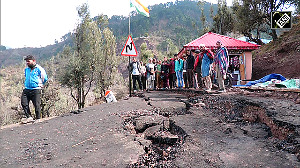As a General Electric employee working in business development in New Delhi, Dhruv Bhatia knew something about finance. Nonetheless, the 36-year-old felt he needed help navigating India 's increasingly crowded investment landscape. "There are so many more banks," says Mr Bhatia. "You are constantly being bombarded." So he signed up to iTrust, a Delhi personal financial advisory start-up.
In seeking help to sift through the vast number of mutual funds, insurance plans, mortgages, credit cards, savings schemes and bank loans that have emerged in recent years, Mr Bhatia is typical of the burgeoning Indian middle class. Rapid growth in the market of such products has created a need for financial education. This has spurred not only the creation of companies such as iTrust but also prompted established financial institutions to offer independent advice.
Citigroup, the financial services group, has launched an educational website to help promote responsible spending. It warns that if credit is used "indiscriminately" it could lead to financial trouble.
In developed countries, a history of personal investment means that consumers are better educated on financial issues. But in India , the massive transformation of financial services has been compressed into just a few years rather than over decades.
"If you are in the UK, you can ask your parents (about investment decisions)," says Kartik Varma, co-founder of iTrust, which launched last year. "But in India , your parents didn't borrow money. There is no institutional memory to serve as a beacon to the younger generation on what to do with money."
The options for investors have expanded at a dizzying pace. Deregulation in the financial services sector over the past decade means private and foreign companies can enter industries once dominated by state-owned groups. As a result, market liberalisation has spawned more than 25 life insurers and 750 mutual funds. Banks now offer credit cards and loans through aggressive telemarketing and other promotions.
Credit has allowed Indians to buy more motorcycles, cars, electronics and consumer durables than ever before. But this year the number of defaults on loans has risen in tandem with climbing interest rates.
To help overwhelmed customers, ICICI - India 's largest private-sector bank - set up Disha Trust, a non-profit body that offers financial counselling services in seven cities, as well as a phone hotline.
ICICI launched the service because of an "increase in personal consumption...and unexpected developments that affect people. As a result they have to strain themselves financially to meet their obligations."
Home buying in India has expanded hugely because of a combination of higher incomes, lower interest rates and a spurt of new construction. Housing finance companies are vying for customers.
Investors have also piled into India 's stock market, whose benchmark index had reached record highs beforethe global economic downturn.
To help curb reckless investment, the Securities and Exchange Board of India (Sebi) launched a national education campaign of newspaper ads and workshops aimed at small investors in 2003. So far 3,000 workshops have been held in conjunction with industry associations and stock exchangesbecause "some investors may not be fully aware of the precautions they should take", according to Sebi.
R K Nair, executive director of Sebi, explains: "We thought we should make them aware of their rights and responsibilities and make people understand the risk."
A Sebi brochure lists "Dos and Don'ts", including advice such as "Don't fall prey to promises of unrealistic returns"; "Don't transact based on rumours generally called 'tips'"; and "Don't panic when facing a problem".
It warns: "Many investors could have avoided trouble and losses had they followed this advice. Remember, it is your hard-earned money."
Financial education is also spreading to the base of India 's socioeconomic pyramid as more of India 's poor gain access to financial services, such as microfinance, insurance and remittances.
"More poor [people] are getting linked to financial services," says Vipin Sharma, chief executive of Access, an Indian microfinance advisory body recently spun out of Care, the humanitarian agency.
Access and Citi have teamed up to offer a financial literacy programme in the state of Madhya Pradesh. Field officers hold workshops for the rural poor, many of whom have low levels of education, to create detailed financial plans and help them understand concepts such as managing cashflow to cope with the seasonality of farm work.
Access is also working with the government of Orissa, a poor eastern Indian state, to train government field workers who can impart simple concepts of financial planning to villagers. Dr A.K. Mohanty, associate vice-president with Access in Orissa, says this might be as simple as advising a villager who drinks five cups of tea each day to drink just two cups and save money.
Dr Mohanty says managing money can help fend off poverty. "The government is keen to work on financial inclusion and that is why they are showing interest in financial literacy."







 © 2025
© 2025